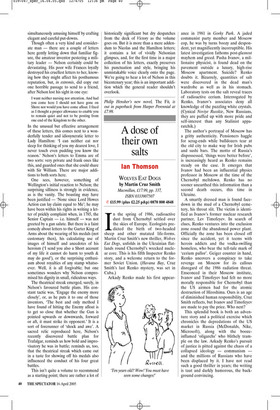A dose of their own salts
Ian Thomson
WOLVES EAT DOGS by Martin Cruz Smith Macmillan, £17.99, pp. 337, ISBN 0333907507 ✆ £15.99 (plus £2.25 p&p) 0870 800 4848 In the spring of 1986, radioactive dust from Chernobyl settled over the skies of Europe. Ecologists predicted the birth of two-headed sheep and other mutated life-forms. Martin Cruz Smith’s new thriller, Wolves Eat Dogs, unfolds in the Ukrainian flatlands round Chernobyl’s wrecked nuclear core. This is his fifth Inspector Renko story, and a welcome return to the former Soviet Union. (Havana Bay, Cruz Smith’s last Renko mystery, was set in Cuba.) Arkady Renko made his first appear ance in 1981 in Gorky Park. A jaded communist party member and Moscow cop, he was by turns boozy and despondent, yet magnificently incorruptible. His latest investigation fathoms post-glasnost mayhem and greed. Pasha Ivanov, a millionaire physicist, is found dead on the pavement outside a luxury, high-rise Moscow apartment. Suicide? Renko doubts it. Bizarrely, quantities of salt were discovered in the dead man’s wardrobe as well as in his stomach. Laboratory tests on the salt reveal traces of radioactive cerium. Interrogated by Renko, Ivanov’s associates deny all knowledge of the puzzling white crystals. (Cynical Noviye Russkie, New Russians, they are puffed up with more pride and self-interest than any Stalinist apparatchik.) The author’s portrayal of Moscow has a gritty authenticity. Pensioners haggle for scrag-ends while bulldozers tear at the old city to make way for Irish pubs and sushi bars. The motto of Russia’s dispossessed, ‘things were better before’, is increasingly heard as Renko remains steady on the case. It emerges that Ivanov had been an influential physics professor in Moscow at the time of the Chernobyl meltdown. Renko has no sooner unearthed this information than a second death occurs, this time in Ukraine.
A smartly dressed man is found facedown in the mud of a Chernobyl cemetery, his throat slit. The victim is identified as Ivanov’s former nuclear research partner, Lev Timofeyev. In search of clues, Renko ventures into the exclusion zone round the abandoned power plant. Officially the zone has been closed off since the accident, yet it teems with heroin addicts and the vodka-swilling homeless, who bear the tell-tale mark of ‘cerium pallor’. Geiger counter in hand, Renko uncovers a conspiracy to take revenge on Moscow for its callous disregard of the 1986 radiation threat. Ensconced in their Moscow institute, Ivanov and Timofeyev had felt no more morally responsible for Chernobyl than the US airmen had for the atomic destruction of Hiroshima. Ours is an age of diminished human responsibility, Cruz Smith reflects, but Ivanov and Timofeyev are made to pay the price. Who next?
This splendid book is both an adventure story and a political exercise which chronicles the depredations of the US market in Russia (McDonalds, Nike, Microsoft), along with the boozeinflamed ‘oligarchs’ who blithely trample on the law. Arkady Renko’s pursuit of justice is pitted against the chaos of a collapsed ideology — communism and the millions of Russians who have been displaced by it. I have not read such a good thriller in years; the writing is taut and darkly humorous, the background convincing.
























































 Previous page
Previous page